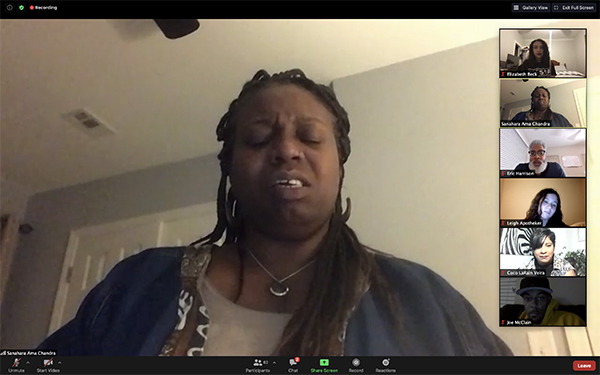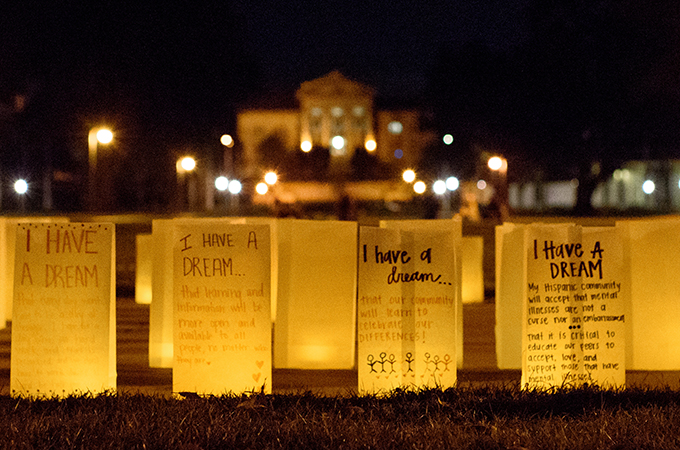The COVID-19 pandemic notwithstanding, the University of Redlands Martin Luther King Jr. Steering Committee developed a week’s worth of virtual programming that celebrated the activist’s life, work, and legacy.
This year’s Martin Luther King Jr. Week focused on the theme of exploring the radical side of King’s work and included events—such as a poetry slam and a day of dialogue—that facilitated important conversations about racism, activism, inclusion, and service.
Coming together
“When I suggested the theme for this week’s events, it was because I view this past year as being anything but normal,” said Senior Diversity and Inclusion Officer Christopher Jones, in his January 18 address that focused on the idea of change as a process. “Part of what I wanted to do was take Dr. King from off the podium at the March on Washington in August of 1963 and make him real to us today.”
Early in the week, events focused on efforts to heal and build community, beginning with a prayer assembly hosted by the Second Baptist Church that brought religious, academic, and public leaders together to offer their perspectives on healing racism in Redlands.
“We pray that the words Dr. King spoke, ‘love conquers hate,’ run prevalent over our community and nation,” said Second Baptist Church Associate Pastor Glen Robinson in his opening blessing. “We pray that our elected officials, of both the nation and our community, unite to stamp out racism and hatred.”
After reading biblical scripture, the group, which included City of Redlands Mayor Paul Foster and Redlands Police Department’s Chris Catren, worshipped together and spoke to the processes of reconciliation and inclusion needed in the city.
Later that evening, the newly formed Black Student, Faculty, Staff, and Administrator Association (BSFSAA) hosted a community poetry slam that featured the work of local Black artists and students. Calling to mind the week’s theme, BSFSAA cofounder Joy Clark recited lines from Martin Luther King Jr.’s A Letter from a Birmingham Jail, before the first poet was introduced.
Johnston Center for Integrative Studies student Carmelo Berreracruz ’22 spoke about the lives of marginalized people and their experiences in his poem, titled If I Had A Conversation with Martin Luther King. “Throughout history, our voices have begged and continue to fight for equal rights, human rights, civil rights,” he said.

As community members’ creative talent and energy were put on display, attendees offered words of encouragement via the event’s chat function and clapped at the end of each piece. In closing, Clark offered a charge to attendees: “To you, my friends, my family, I say, ‘Let nothing stop you from fulfilling your purpose.’”
Learning together
Throughout the week, The Radical King (Beacon Press, 2015), a collection of King’s speeches and other work, was referenced repeatedly. During the Day of Dialogue, which was hosted by the School of Education and its Center for Educational Justice, three panels of speakers used the book as a framework for conversations about racism, equity, and inclusion.
Before those conversations commenced, Naslund Endowed Dean Mario Martinez spoke about King’s emphasis on serving others and lifelong learning, as well as how both apply to the mission of the School of Education. Offering his ideas on accessible education, leading by example, and taking action, Martinez urged the event’s attendees to continue the fight for justice after the day’s panels had ended.
“We should never be satisfied that we’ve arrived, for just when we think we have reached the destination, we find that events have shifted on the ground beneath us,” Martinez said. “We’ve seen that in the last nine months to a year. It is an ongoing and continuous journey to serve and learn.”
Throughout the day, faculty members, staff, administrators, students, and local educators contributed to discussions that examined King’s principles as an educator and the ways that the U of R community seeks to embody the University’s anti-racism statement.
During a conversation about activism and antiracism, Chanel Parrish ’21 offered her hope for the future: “I want to encourage the fact that the voices of Black, Indigenous, and other people of color not just be centered on MLK Day or Black History Month, but that we have a continuous platform for our voices to be heard, centered, and valued. This is a great start to that, and I’m hoping that we have more opportunities in the future to make our voices heard.”
Serving together
In addition to thinking and talking about King’s activism and scholarship, other events during the week emphasized serving others.
On January 21, the Office of Community Service Learning hosted the “I Have a Dream” luminaria ceremony. In honor of the speech that King gave in 1963, students, faculty members, and staff wrote their dreams on paper bags that were then used as lanterns and placed in the Quad on the main campus. The next day, a group of students from the Students Together Empowering Peers (STEP) program delivered a presentation on King’s life and lessons to local 1st through 8th grade students enrolled in the Big Buddies program.
The final event, an annual religious service, combined the week’s motifs and encouraged participants to meditate on them.
"One of the key tenets of a radical Martin Luther King Jr., was his idea of radical love," said Vice President of Advancement Tamara Josserand, who joined forces with Amanda Chiles ’21 to speak on the topic. "Radical love—this concept he wholeheartedly embraced, embodied, shared with others, and was the foundation for his nonviolent movement. Dr. King thought that love was the most powerful force that could destroy hate and change the world... My prayer for this University community that I have grown to love, and this country that I deeply love, is that we have the strength to move forward, with radical love and the courage of our convictions."
Campus Diversity and Inclusion Interim Director of Diversity Initiatives Monique Stennis noted that Josserand’s remarks left an impression. “It is hard to narrow down my favorite event—the steering committee did a fantastic job bringing forth programs from various campus organizations highlighting the radical side of Dr. King. Tamara Josserand's talk on radical love was a phenomenal end and call to action to the civil rights leader's legacy.”
View recordings of the week's events and learn more about the University of Redlands.






